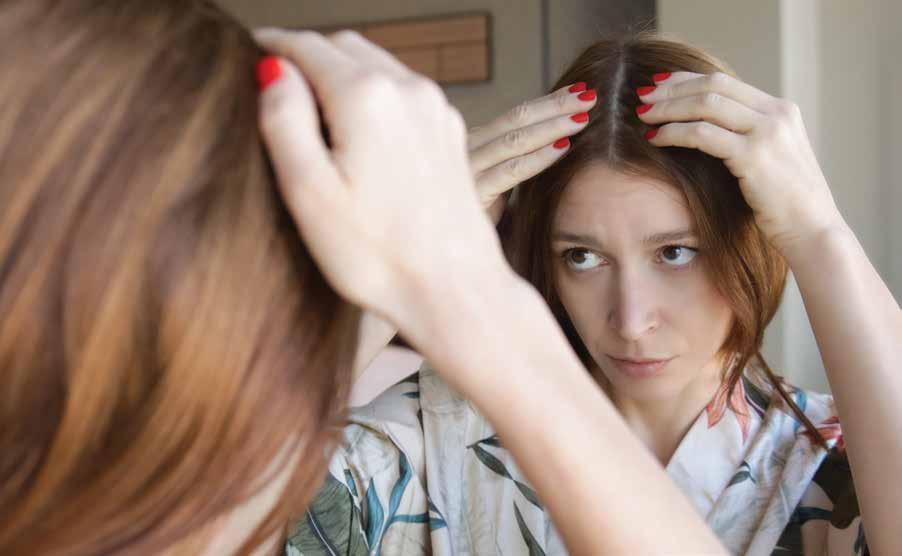
4 minute read
Scary Shedding
BY DR. SHELBY ENTNER, nd
Hair loss for women is a complicated and emotional issue. Few conditions bring women in my office to tears as quickly as sudden and unexpected hair loss. Every patient starts by saying “It’s just hair and I know it’s not a big deal compared to ‘ABCD’ but it’s all over my bathroom floor, my brush is full, and I feel like I’m going to be bald soon!” There are multiple causes of hair loss and there’s one way to stop the loss and start the regrowth process—identify the cause and address it.
DR. SHELBY ENTNER, nd is a licensed Naturopathic Physician and the owner and founder of Vero Health Naturopathic Medicine in the Okanagan. She earned her doctoral degree in Naturopathic Medicine in 2002 after ten years of studies. Dr. Shelby empowers patients to make changes that are in alignment with their health values and goals and seeks to find answers by looking at the whole picture, instead of simply at a symptom.
Hair loss (alopecia) happens to about 30% of adult women at some point. The most common form in women is female pattern hair loss (also called androgenic alopecia), where the hair loss is most often around the hairline and the crown of the head. Lab testing is an important part of making the right diagnosis of why hair loss is occurring. Many hormonal, nutritional, and lifestyle factors can contribute to hair loss. The good thing is there are many natural ways to support hair loss and encourage hair regrowth.
Thyroid health is a common area that I treat in my practice and when testing is done to evaluate TSH/FT4/FT3/TPO/RT3, we are able to uncover dysfunction that isn’t always found with just TSH lab values. Abnormal thyroid function is found in about 24% of women with new onset alopecia, according to a study done in a 2014 in the Australasian Journal of Dermatology. If you are having fatigue, foggy brain, weight gain, and your hair is feeling dry and brittle, it is time to get your thyroid tested!
Low iron levels are another common cause of hair loss. Most women have regular cycles that can lead to minor losses of blood each month, but over time or with heavier flow that blood loss can add up and iron levels can go down. Add in a lack of dietary iron, issues with iron absorption, or other causes of blood loss, and women can be particularly at risk of low iron levels, affecting hair growth. In a 2013 study by the Journal of Korean Medical Science, over 80% of the women affected by hair loss were found to have ferritin levels of less than 70 µg/L. If you are tired easily, look pale, and feel short of breath with activity, then it is time to get your iron tested! Inflammation in the hair shaft can be another cause of hair loss for women, which can be from a lack of dietary support for the hair. Nutritional deficiencies are often linked to rapid shedding and poor regrowth. Many popular supplement companies make a variety of hair formulas, often including B vitamins such as biotin, and minerals such as zinc, selenium, copper, and manganese. A lack of certain nutrients can make the hair follicle more inflamed and brittle, causing a decrease in the number of new hairs replacing natural hair loss. Inflammation can also be linked to fatty acid levels or vitamin D being low, and a multitude of other nutrition causes. Fascinating research is being done right now about the microbiome of the hair follicle: an ongoing study is looking at the incidence of Propionibacterium acnes causing a cascade of inflammatory markers linked to alopecia in women. When the number of P. acnes was high, it created a shift in the size of the hair follicle, shrinking it and making the hair thinner and more fragile. Inflammation can be due to a variety of reasons such as the level of bacteria.
Another very common cause of inflammation is hormone changes. Women’s hormones play a tremendous role in hair loss. Many women who suffer from hair loss have Polycystic Ovarian Syndrome (PCOS). These women have excess androgens (testosterone, DHEA) which causes hair loss that usually shows as a spreading of the midline hair part. Androgen excess can also occur during peri-menopause—estrogen levels start to decrease and testosterone levels can rise. Estrogen levels rise in pregnant women and most moms notice their hair becomes thicker and fuller during pregnancy. A drop in estrogen postpartum leads to massive hair loss and this estrogen drop can affect women at other times of their lives. Hormone fluctuations seen with birth control changes, peri-menopause, and postpartum often result in hair loss as well. Cortisol levels elevated due to significant stress can also cause a rapid increase in hair loss. Sudden weight loss, emotional stress, and injuries can signal the body’s cortisol to rise to deal with the stress, and also impact the growth of hair.
With all of this information, what are women to do to figure out the scary shedding? First off, get some labs! This will provide the basic medical information necessary to evaluate nutrients, hormones, and possible causes of inflammation. Supplements can be very helpful but understanding the root cause of the hair loss should be the first step. Work with your integrative doctors to understand the reasons for hair loss. We know how much it can affect your self-esteem when your floor looks like you made a hair rug!










